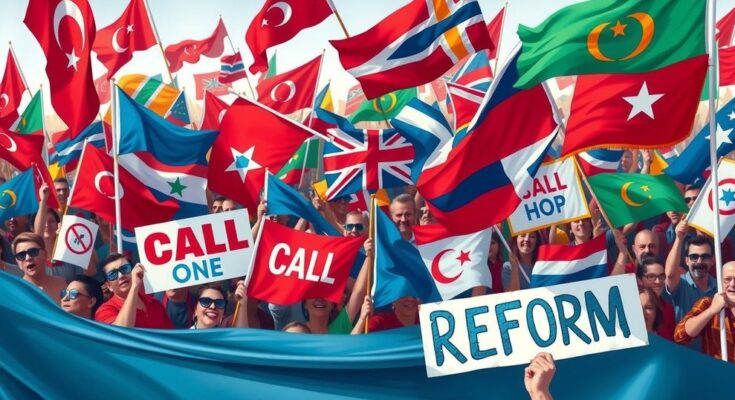Colombian President Gustavo Petro calls for a special election to advance health and labor reforms, criticizing resistance from centrist and right-wing politicians. He aims to energize supporters and hold legislators accountable, despite challenges in mobilizing voter turnout and the practicality of proposed changes.
In a recent rally, President Gustavo Petro of Colombia called for significant reforms in the nation’s health and labor systems, urging citizens to resist centrist and right-wing political opposition. During his speech, he announced plans to hold a special election, known as a popular consultation, allowing voters to either endorse or reject the proposed reforms, which have faced substantial obstacles in Congress.
Petro criticized opposing lawmakers, describing them as “monarchs and tyrants” who are driven by greed, and encouraged the public to hold them accountable. He emphasized that Colombians have made considerable sacrifices and deserve a government that prioritizes their welfare rather than corporate interests. The president gave public sector employees a day off to attend the protests promoting the special election.
The proposed special election, requiring Senate approval, necessitates participation from one-third of registered voters to be valid. Political analysts have expressed skepticism about the capability of Petro’s government to mobilize such turnout, given his electoral support of 11.2 million votes in 2022. However, it could energize his supporters ahead of upcoming congressional elections in March.
Petro’s health reform aims to eradicate private insurance roles, replacing them with a government agency for public health administration. He has accused insurance companies of mishandling funds, while legislators worry the government lacks the capacity to manage this vast responsibility. Additionally, Petro’s labor reforms seek to secure better pay for night workers and limit short-term contracts, although these measures were recently stalled in Congress amid concerns they could lead to higher unemployment.
With over 55% of the Colombian workforce engaged in the informal economy, critics argue Petro’s proposals might disincentivize job opportunities for these vulnerable workers, complicating his intentions to promote labor rights without deferring unemployment risks.
President Gustavo Petro is urging a special election to push forward critical reforms in Colombia’s health and labor sectors amid significant political resistance. His administration aims to energize supporters and hold lawmakers accountable for their actions against proposed changes. However, challenges persist regarding voter mobilization and the practicality of the reforms amid opposition and concerns over the informal labor market.
Original Source: www.newsday.com




